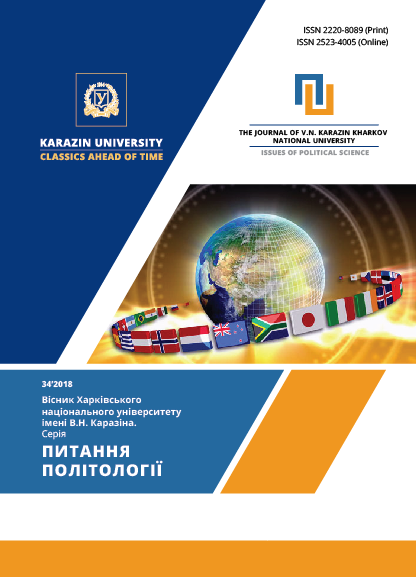MASS MEDIA AND CORRUPTION: UKRAINIAN REALITIES
Abstract
Such phenomenon as a corruption in mass-media, its origin, formation and media relations with other spheres of political life of the country is considered. Their role in political life is analyzed. Such functions of them, as mobilization and informative ones, function of socialization, function of expression of interests of society and function of public opinion formation are distinguished. Duties, possibilities of mass media, and also problems that appear in front of them, are explained. The major functions of mass media and order of their use are distinguished for the different political regimes, in particular at authoritarian, totalitarian and democratic ones. The features of their functioning in terms of the democratic regimes are analyzed.
The main mass media weaknesses, such as its corruption, ordered media plots that reflect business or political divergences and lack of own journalistic investigations are determined. The role of printed and electronic mass media is distinguished. The priority attention to the television, broadcast and the Internet communication is given. The main attention is given to the determination of Ukrainian mass media development level in the estimation of international organizations, in particular Reporters without borders, and informative centers, for example, «Detector of Medias», and also the illumination of different countries’ events in their reports. The main suppliers of media information, their owners are distinguished.
The concept of media corruption, its role in modern media space of Ukraine is considered. The features of state, municipal and commercial mass media are distinguished. The influence on forming of the «agenda», that provides efficient communication of publicity and executives is analyzed.
Downloads
References
“Media ownership monitorˮ, Reporters witout borders URL: https://www.mom-rsf.org (дата звернення 1.12.2018).
Національне агентство з питань запо-бігання корупції. Потенціал засобів масової інформації у протидії корупції. 2017 URL: https://nazk.gov.ua/sites/default/files/docs/nazk_files/doslidzhennya/6.pdf (дата звернення 30.11.2018).
“Джерела інформації про стан справ в Україні. Соціологічне опитуванняˮ 2017, Детектор медіа. Вплив пропаганди на суспільну думку в Україні. URL: https://ms.detector.media/mediaprosvita/research/yak_rosiyska_propaganda_vplivae_na_suspilnu_dumku_v_ukraini_doslidzhennya/ (дата звернення 1.12.2018).
Дмитрієва, E. А. 2004. “Засоби масової інформації та ФПГ: закляті друзі?ˮ, Влада. 7: 5-12.
Прохоров, Е. П. 2000. Вступ до теорії журналістики: навчальний посібник. Москва.
Мунчик, А. М., Ворона, П. В. 2016. “Роль засобів масової інформації у формуванні політичної системи (управлінський аспект механізму впливу)ˮ, Український науковий журнал «Освіта Регіону». Київ: 197-202.
Кара-Мурза, С. Г. 2002. Маніпуляція свідомістю. Москва.
Author’s copyright and licensing.
License Terms: Authors retain copyright and also grant the Journal the right to publish original scientific articles that contain research results and are not under consideration for publication in other issues. All material is licensed under a Creative Commons Attribution License International CC-BY, which allows others to distribute their work with the copyright of this work and recognition of the first publication in this Journal.
If the article is taken for publishing in The Journal of V.N. Karazin Kharkiv National University. “Political Science Issues”, the author must sign a copyright transfer agreement. The agreement is sent by post (original document) or by e-mail (scanned copy of the document) to the Editorial Board of the Journal.
By this agreement the author certifies that the submitted material:
- does not violate the copyrights of other people or organizations;
- has not been previously published in other issues and has not been given for publishing to other issues.
The author gives the editorial board the rights to:
- publish the article in Ukrainian (English) and distribute its printed version;
- translate the article into English (for articles in Ukrainian) and distribute the printed version of the translation;
- distribute the electronic version of the article, as well as the electronic version of the English-language translation of the article (for articles in Ukrainian and Russian), through any electronic means (placing on the official journal web site, in electronic databases, repositories, etc.).
The author reserves the right without the consent of the editorial board and the founders to:
- Completely or partly use the materials of the article for educational purposes.
- Completely or partly use the materials of the article for writing own theses.
- Use the materials of the article to prepare abstracts, conference reports, and oral presentations.
- Post electronic copies of the article (including the final electronic version downloaded from the journal's official website) to:
- personal web-resources of all authors (web sites, web pages, blogs, etc.);
- web-resources of institutions where authors work (including electronic institutional repositories);
- non-profit, open-source web resources (such as arXiv.org).




